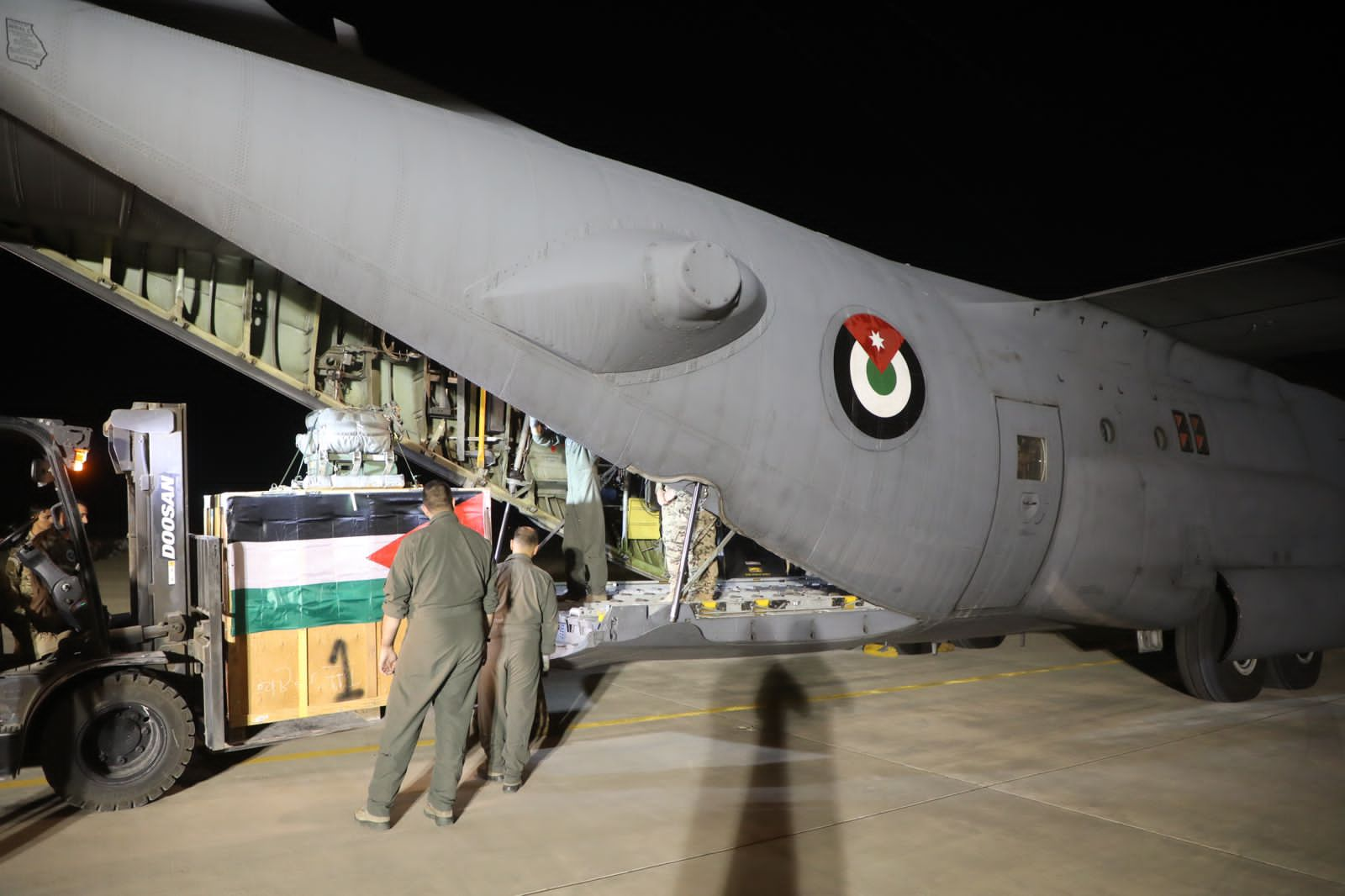Jordan’s king travelled to Qatar on November 2, where he met with Sheikh Tamim over the developments in Gaza.
Jordan cooperated with Qatar and the United Arab Emirates to airdrop aid to a Jordanian field hospital in Gaza on Saturday, in an effort to provide urgent medical assistance to thousands of wounded Palestinians in the Strip, Amman’s news agency (Petra) reported.
“The drop operation came in cooperation with the United Arab Emirates (UAE) and Qatar to enhance the hospital’s capabilities and increase the ability of medical personnel to provide health and treatment services to Palestinians in Gaza,” Amman’s news agency (Petra) reported on Sunday.
A similar mission was conducted by the Jordanian Royal Air Force last week, though that occurred as part of Jordanian-Israeli coordination.
Jordan and Israel established ties under the 1994 Wadi Araba Peace Treaty, which guaranteed the former the restoration of its occupied areas of Al-Baqoura and Al-Ghumar.
Amman is also the host of a large population of Palestinians that were forcibly dispossessed in 1948 during the Nakba, or “catastrophe”, that marked the establishment of Israel.
Despite its relations, the kingdom has appeared to take a more bold stance in the face of Israel’s most recent and brutal aggression in Gaza, in which thousands of Palestinians have been killed and hundreds of thousands displaced.
Last month, Jordan’s Foreign Minister Ayman Safadi recalled its ambassador to Israel over the “unprecedented humanitarian catastrophe” in the Gaza Strip.
The kingdom said it would only send back its envoy if Israel halts its onslaught and called on Tel Aviv to recall its ambassador to Amman. Israel had at the time already evacuated its embassies in Jordan as well as other countries that it shares ties with, including Bahrain and Morocco.
Israel’s relentless bombardment has intensified in recent days and global calls for a ceasefire have appeared to fall on deaf ears.
Israeli occupation forces (IOF) have killed more than 11,200 Palestinians, including 4,600 children, though the figure is believed to be much higher as contact with key hospitals remains sporadic.
The bombardment of the densely populated enclave has displaced at least one million people, with thousands forced to flee to the south of Gaza on foot on Friday following Israeli threats.
There have also been heightened concerns of an Israeli plan to clear out Gaza and force its native population into neighbouring Sinai.
The official spokesman for the Jordanian government Muhannad Mubaidin had warned that any such plans to displace Palestinians from Gaza or the West Bank—where the IOF has intensified its raids over the last week—would be considered by Amman as a declaration of war.
Growing ceasefire calls
Jordan’s King Abdullah II travelled to Qatar on November 2 where he met Qatar’s Amir Sheikh Tamim bin Hamad Al Thani and called for international action to effectively reach a ceasefire in Gaza.
The two leaders also attended the Arab-Islamic summit in Riyadh on Saturday. In his speech, King Abdullah highlighted that the “injustice” in Gaza “did not begin a month ago.”
“It is a continuation of over seven decades dominated by a fortress mentality of separation walls and violations against holy sites and rights, the majority of whose victims are innocent civilians. It is the same mentality that seeks to turn Gaza into an unlivable place,” the Jordanian leader said.
Speaking at the summit, Sheikh Tamim also called out the “global immunity” towards the ongoing Israeli massacres of Palestinians in Gaza.
“As our hearts break with pain at the sight of the mass killing of children, women, and the elderly, and the human suffering, we wonder how long will the international community continue to treat Israel as if it is above international law? And how long will it be condoned to flout all international laws in its brutal, never-ending war on the country’s indigenous population? ” the Qatari leader asked.
The Israeli bombing and accompanying crippling siege has exacerbated already dire conditions in the Gaza Strip, where 2.3 million people have been deprived of essential services and resources
The United Nations said on Sunday that at least 852 trucks have since crossed over to Gaza, though none of them contained much-needed fuel to power the Palestinian enclave.
The UN said on the same day that the aid covered only 3% of Gaza’s essential requirement, with the number of trucks that entered way below the pre-war daily average of more than 400.
Israel has intensified its attacks on healthcare facilities, including the vital Al Shifa Hospital, Al Rantisi Hospital, and the Indonesian Hospital.
In his speech, Sheikh Tamim also questioned the absence of action from the international community to halt such crimes and addressed Israel’s long-used claims on the alleged presence of Hamas tunnels under health facilities.
The Qatari leader added: “Who would have imagined that hospitals would be openly bombed in the twenty-first century, and that entire families would be erased from the records by the indiscriminate bombing of residential neighbourhoods and refugee camps?”







